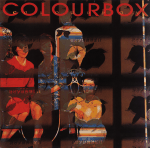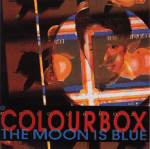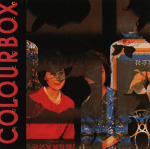


This is from the excellent 'New Britain' zine that was edited
by Matt and did the rounds in the mid-90s. It has dated a bit
now, but what the hell.
The following is an interview I did a long while ago with acclaimed London DJ Andy Weatherall. Essentially Weatherall is a DJ playing dance music in nightclubs, but his background, influence and intelligence have set his Djing and his own music (he has re- constructed numerous artists' records and his own solo efforts are recorded under the name of Sabres of Paradise) apart from most of the other boring fools he shares the "clubbing scene" with.
"Colourbox are a pretty big influence, that's the sort of dance stuff I liked. I was never a great disco or soul fan, the stuff I was into was 23 Skidoo, 400 Blows and Adrian Sherwood. So Colourbox were and still are a big influence. Not just musically but in attitude because they could have really copped out and gone for commercial success, but they never did because that didn't interest them. I always liked that attitude."



Andy's first solo effort under the moniker Sabres of Paradise was a reconstruction of Throbbing Gristle's 'United'. Throbbing Gristle were Genesis P-Orridge, Cosey Fanni Tutti, Sleazy and Chris Carter. Their practices in drug induced [????? - JE] electronic music, performance art and situationism [nah mate - JE] resulted in over twenty LPs and hundreds of head-fuck live shows during the seventies. In fact, it can be said that TG were early pioneers of techno, they just didn't have ponytails. The best examples of TG's output can be probably reduced to just two releases - Twenty Jazz Funk Greats and the grisly D.O.A. Third Annual Report [Wot no Heathen Earth?! - JE].
"They were ahead of their time. It's only now that their influence and importance are being seen. It's the same with any band that swims against the tide. Their value isn't known until years later. It's like with the band Suicide. I'm listening to a lot of Suicide at the moment and that's a big influence. It's weird, you go out and talk to people in their early twenties/late teens and they're into techno and you say 'Do you know Suicide?' and they don't know it. Basically it's techno with Elvis singing over it. Those kids are probably listening to records by people old enough to have been influenced by Suicide and they don't know it. They don't even realise where the influences are coming from because those are so in the past, but they've had like this subliminal influence on people."

It's like what's being taught in the colleges and schools. Great artists and different movements and phenomena are never for the most recognised by academia and the establishment in their time, but years later they'll be part of the curriculum
"Because it's not the accepted rules and regulations. But that's the kind of music I like best, even if I don't necessarily like the end product, it's the concept behind it and the fact that it's like 'non-music' sometimes It's like with rave music, these really heavy rave records. I don't like them to listen to, I don't think they're particularly good records, but I like the reaction they cause in people. You get these rave records that are really almost 'non-music', and they're in the top ten."
And thousands of little kids are dancing to them all over the country
"Yeah, I think that's good and the fact that it upsets the old A&R men - 'Oh no it's not music, they can't play their instruments.'"
It's the same effect that punk had but it's even more extreme than that, and even more non-musical than that. Some of it sounds like TG with a breakbeat behind it
"It's turned the whole thing upside down - non-commerciality has become commerciality. Everything else is so boring now and you've got to 1993 and you've taken music as far as it will go and anything that's non-commercial is now commercial."
It's just a big circle
"Yeah and then people will get bored with that and it will just keep going around. Boredom is a good spur to move people on Like with Throbbing Gristle, I'm sure that there are what you call serious classical pieces I'm sure there were pieces from the thirties and forties"
Well, the surrealists messed around with noise
"Yeah, like nothing is totally original, if you trace it back. If you find out what the people making that sort of music were listening to, if you talk to them or see a list of their favourite records, you'll see records that are ten years before and if you go back to those people twenty years were you can follow it back to something else, and something else. It's all part of a logical progression.
And if you tap into that energy that moves people on the cutting edge the innovators
"Exactly"
It's like the followers, the majority of these scenes are often miles apart from each other but the innovators and cutting edge artists seem for the most part very close, even similar in outlook. Look at for instance say, John Coltrane, Led Zeppelin, Throbbing Gristle, Derrick May, in my mind they're all very similar.
"Yeah, yeah. Basically innovators don't wear blinkers. They're taking little bits from everywhere and making something new. There's not a lot you can do now there's only so many notes and structures. If you're an innovator you've got to be looking outside your sphere, that's how music progresses. It upsets purists, but that's a good thing or else where would we be? If we take it back to its logical conclusion if you're a musical purist you should be basically listening to tribal drums and nothing else. Even if you're a soul purist, something is got to have come before that. The innovators of that time probably fucked off the purists. That's what I'm saying. Innovators don't wear blinkers, they're just open to every influence they can be. <elitism> It's just when you present it to a wider audience that's when the blinkers get put on again because they don't realise I'm influenced by thrash metal in the sounds that I'm using. But if I'm playing to an audience and I say to someone 'listen to this' and I play the thrash metal record afterwards, they just wouldn't get it. It's the listening audience, they're the ones with the blinkers, who turn into purists. </elitism>
And since your records are going out to a lot of people now, I guess you're having to keep that in mind, whereas if you're only playing for thirty people you can be as wild as you want
"I do think about that. It's nice being popular and it's nice that people buy your records. I don't want to alienate anybody people who have supported me Hopefully, that's why people like what I do, because they don't know what to expect. When they buy a record with my name on it, they'll think 'what the fuck's that going to sound like."
"I'm in a lucky position, where from day one I've made it clear that what I'm doing and you're going to be listening to is maybe not what you're used to. Now I've come to the point where I don't really have to worry about the audience because I know there are different people who will buy it because it will be something different."
Plus if you're dragging in all these influences, you're going to be introducing people to sounds, and then ideas, that they might not have heard, experienced and thought about.
"Yeah, hopefully. The sort of bands I work with are right across the board, from Galliano to Throbbing Gristle, from jazz funk to industrial music. Hopefully someone along the way will say 'I'm into Galliano, but this sounds good, I wonder what it is'"

Like the whole TG and industrial scene was very ghettoised and insular, but now through DJ-ing and your own music you're getting those same fucked up electronic noises to a wider scene.
"It was ghettoised to a point. And now because of the nature of the times we're living in, everyone wants that thrill faster and faster. The underground has become so interesting to television it's exposed to more people. It was happening anyway, but when acid house took off the underground made such an impression on the overground that television started taking notice and the magazines started taking notice and now that underground is so much easier to come by. It's a good thing, but it's also a bad thing because it's too easy. The whole nature of an underground is stumbling on it and discovering it for yourself, not switching on the telly and seeing a documentary about industrial music that's the bad side. It's good if it turns people on, but the bad thing is that it's too easy. I always think that underground and subversive things shouldn't be easy to find, you should search them out."
"But it's just part of the culture we're living in. You can turn on the telly and everything is happening so fast and information is available so freely now. That's what made the underground turn into the overground that information is so much easier to come by. The good thing about it is that kids who didn't know anything about it can get into it, but the bad side is that businessmen see and think they can make money out of it, water it down and"
And control it, when what made it good in the first place was that it was out of control.
"I'd rather stumble across a record, a book or an artist accidentally in a shop or a gallery rather than switching on the telly and it's all explained"
A lot of your records are like classical pieces, if you step back from the dance floor you'll hear layer over layer of different things going off.
"That's the whole idea. If you hear it on a dancefloor you'll hear one thing, but at home with headphones on you'll hear something else you might not have heard. I do like to make things substantial, not just throw-away dance tracks that's not my style. Stock Aitken and Waterman do that, and fair play to them. They do it well, but I don't. Everyone probably thinks it's really easy to produce a Stock Aitken and Waterman track, but seriously put them in a studio and tell them 'now write a top twenty dance hit'."
"Sometimes it happens by accident. Like 'Loaded' ended up in the charts. But I don't set out to do that, I set out to make something a bit more lasting. At the end of the day I always remember a thing John Peel said: 'what will you remember the seventies for?'"
"Even him, even John Peel remembers the seventies for Slade and the Osmonds. He won't remember the seventies for some obscure industrial record he played, know what I mean? So perhaps pop is longer lasting after all."
But people are continually discovering underground scenes from the past for themselves. Maybe in twenty years time people will be collecting your records like they collect old punk and soul now.
"Hopefully. I'd love to think so. That's part of the reason behind the record label. I like the collectability, that doesn't come first, the music comes first. But I do like that collectability, like Factory when I was younger, and certain dance labels. That's the reason to put out stuff that is different.